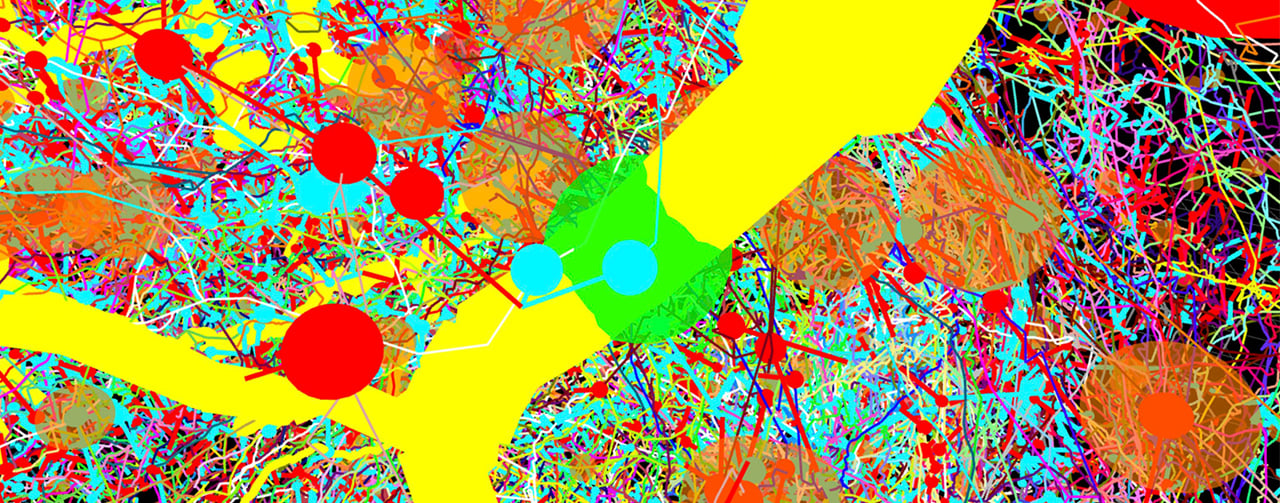
Albert Cardona, HHMI Janelia Research Campus
Re-politicising Public Health: A workshop for early career ethnographers
The Ethnographies and Health Network present their second early career workshop, bringing together critical ethnographers from across the social sciences.
1-2nd Oct 2018, King's College London.
This two-day workshop invites participants to interrogate how ethnographic research can lend itself to political change in health, paying close attention to methodological problems that may arise in enacting what we might call “activist scholarship”.
This workshop provides opportunities to interrogate how ethnographic research can lend itself to political change in health, attending to problems that may arise in enacting what we might call “activist scholarship”.
We are a group of early career researchers working with Professor Simon Cohn and Professor Chris McKevitt, across King’s College London and the London School of Hygiene and Tropical Medicine.
Read selected publications from our keynote speakers, along with a round-up of the previous Ethnographies and Health Workshop by discussant Professor Judith Green.
Recent updates
Events
Newsletter
Contact us
“Re-politicising public health” was inspired by another SHI funded workshop put on by early career researchers at the London School of Hygiene and Tropical Medicine (LSHTM) in 2015, called “Ethnographies and Health”. This focussed on the how ethnography as a practice, methodology and theoretical orientation brings a unique and often underrecognised perspective on ‘health’.
The workshop was attended by a wide range of doctoral and postdoctoral researchers from across the social sciences who had the opportunity to share and gain feedback on their work. They also heard from keynote speaker Professor Tiago Moreira who spoke on being attuned to “little stories” that help us reveal the “multiverse” of health. As a result, the participants formed the Ethnographies and Health Network, and are soon to be releasing a book: “Ethnographies and Health: Reflections on Empirical and Methodological Entanglements”, eds. Garnett, E; Reynolds, J and Milton, S. To be published by Palgrave Macmillan c. August 2018.
We aim to build on the discussions within the network, with an explicit focus on the power of ethnography to both reveal and act upon the politics of public health. As a group of early career researchers collaborating across LSHTM and King’s College London we have often been frustrated by the lack of meaningful political discussion in an area so fraught with blatant inequalities. Through our discussions influenced by Science and Technology Studies, Critical Public Health and even Affect Theory, we have therefore begun to think about ethnography’s role in re-politicising public health.
We hope this second workshop presents an opportunity for both present members and newcomers to build on the Ethnographies and Health network, and begin to think about its relation to inequalities, and the politics of ethnography as both working in and “on the world”.
Recent updates
Events
Newsletter
Contact us
Re-politicising Public Health: A workshop for early career ethnographers
King’s College London, 1st and 2nd October 2018
Overview
This two-day workshop invites participants to interrogate how ethnographic research can lend itself to political change in health, paying close attention to methodological problems that may arise in enacting what we might call “activist scholarship”.
Confirmed keynote speakers
Ingunn Moser (VID Specialised University, Oslo)
Michele Lancione (University of Sheffield)
The call
Our point of departure is a shared concern that health related research often shies away from both discussion and engagement in political change; we are interested in disrupting this trend by drawing on ethnographic methodologies. We are particularly interested in the ways ethnographies might connect us to new and unexpected ways of influencing the world. Yet we are also acutely aware of the uneasy relationship that ethnography can have with “more direct” political work such as activism. Through critical and imaginative engagement with concepts such as impact, accountability and power, this workshop will explore how ethnographic methods can re-politicise public health research.
Our discussion will build on work that explores the role of the “activist” researcher doing ethnography; how researchers should “follow the trouble” to understand practices of power (Marcus, 1995; Graeber, 2004; Haraway, 2010). We will attempt to go beyond these discussions to look at how we can take an active positionality within the research, thinking about ethnography as both process and product. How do ethnographers and ethnographies act, not just in the world, but “on the world” (Singleton and Law, 2013)
Zooming in from these big questions, we seek to explore a number of questions relating to different elements of the research process, such as: the power researchers have over how they engage with and represent participants; the difficulties of uncovering an underlying meaning or ideological narrative behind people’s everyday actions; and how to maintain trust in disseminating critical research. Specific questions of interest are:
- How does the research question and methodological design either propagate or reduce inequalities in the area of research?
- How active or passive should we be when in the field? What does it mean to actively ‘intervene’ in our ethnographic encounters?
- What kind of relationship do we as researchers have with participants, and how can we disrupt persistent power imbalances within data generating practices?
- How might we negotiate or disturb tensions between traditional conceptualisations of ‘impact’ and ethnographic commitments to complexity?
Participants
We invite participants (doctoral students, post-doctoral and self-defining early career researchers) to discuss these themes in a range of different fieldwork settings focusing on health and inequality, broadly defined. We welcome perspectives from a range of disciplines including anthropology, sociology, geography, history and more.
Organisers
The workshop is organised by Hannah Cowan, Natassia Brenman (London School of Hygiene & Tropical Medicine) and Charlotte Kühlbrandt (King’s College London), with the support of Professor Simon Cohn and Professor Christopher McKevitt who will be our discussants. The Foundation for the Sociology of Health and Illness has generously provided funding for the workshop.
Outputs
This workshop follows the success of the 2015 “Ethnographies and Health” workshop, which sparked the creation of a network of early career academic researchers which continues to forge connections across the social sciences. The workshop offers participants the opportunity to join the network.
We anticipate a high-profile publication composed of selected papers from the workshop, as well as capturing our politicising contribution to the network through online platforms (i.e. Somatosphere, who has welcomed our proposed report, and our organiser’s blog, Disruptive Inequalities).
Format
We envisage a small workshop, capped at 20 presentations.
Prior to the event, we will organise a buddying feedback system, whereby delegates will be asked to read the paper of another delegate in advance. At the workshop itself, delegates will be asked to briefly comment on their buddy’s paper, before opening up the floor for further questions. The sharing of these short papers will help ensure that it is a productive and supportive experience for everyone involved.
Two keynote speakers will open each day with reflections on their own experience of politicising ethnographic research. Each participant will then have 10 minutes to present without slides, followed by a discussion. We particularly encourage unconventional forms of presentation or alternative visual material.
Attendance
Attendance is free of any cost to invited participants. Lunch and refreshments will be provided on both days, and there will be a networking and social event on the evening of the 1st October. Five small bursaries of £75 will be available as contributions towards travel and accommodation costs for delegates with limited funding for attending workshops. Please indicate when you submit your abstract if you wish to be considered for a bursary and why.
Abstract submission
Abstracts should be submitted as a Word document to ethnographies.health.2018@gmail.com, no later than the 30th June and should not exceed 250 words, excluding title. Please also include your title, your position and institution, and pick out 3-5 key words or phrases (not included in the word count) to focus our attention to themes and issues you are most interested in discussing. We will notify you if your abstract is successful by the end of July. If accepted, we will ask you to submit a short written version of your paper in advance of the workshop (mid September), to be shared with another delegate as described above.
Recent updates
Events
Newsletter
Contact us

|

|

|

|

|

|

|
Join the Ethnographies and Health Network Mailing List through the following link for emails on conferences, workshops, training and other activities relevant to our field.
Recent updates
Events
Newsletter
Contact us
See details of the 2015 “Ethnographies and Health” workshop.
A round-up of the 2015 workshop by discussant Professor Judith Green on LSHTM’s Kritikos study group page.
A selection of Ingunn Moser’s publications:
- Mol, A, Moser, I. and Pols, J.(eds.) (2010) Care in practice: On tinkering in clinics, homes and farms, Transcript Verlag, Bielefeld.
- Moser, I. (2010) “Diagnosing and acting upon dementia: The Marte Meo Method” in Goodwin, D., Mesman, J. and Buscher, M. (eds). Ethnographies of Diagnostic Work, forthcoming with Palgrave University Press, London.
- Thygesen, H. and Moser, I. (2010) “Technology and good dementia care: An argument for an ethics-in-practice-approach”, in Schillmeyer, M. and Domenech, M.(eds) New Technologies and emerging spaces of care, Ashgate Publ., London.
- Moser, I. (2011) ”Dementia and the limits to life: Anthropological sensibilities, STS interferences, and possibilities for action in care”, Science, Technology & Human Values; Vol 36 (5) s. 704-722.
- Moser, I. (2016) “Sociotechnical Practices and Difference: On the Interferences between Disability, Gender, and Class” in Devlieger, P. et.al. (eds.) Rethinking DisAbility: World Perspectives in Culture and Society, London/Antwerpen: Garant Publishing.
A selection of Michele Lancione’s publications:
- Lancione, M. (2014). Entanglements of faith: Discourses, practices of care and homeless people in an Italian City of Saints. Urban Studies, 51(14), 3062–3078.
- Lancione, M. (Ed.). (2016). Rethinking Life at the Margins: The Assemblage of Contexts, Subjects, and Politics. Routledge.
- Lancione, M., & McFarlane, C. (2016). Life at the urban margins: Sanitation infra-making and the potential of experimental comparison. Environment and Planning A, 48(12), 2402-2421.
- Lancione, M. (2016). Racialised dissatisfaction: homelessness management and the everyday assemblage of difference. Transactions of the Institute of British Geographers, 41(4), 363-375.
- Lancione, M. (2017). Revitalising the uncanny: Challenging inertia in the struggle against forced evictions. Environment and Planning D: Society and Space, 35(6), 1012-1032.
Recent updates
Events
Newsletter
Contact us
Tarek Younis, a member of the Ethnographies and Health Network is talking about ideas he developed at our workshop on re-politicising public health at the following event:
QHRN Seminar Series: Re-Politicising Health Research
This call for abstracts for a special issue could be very relevant to workshop participants. For more information, please follow the link.
Special issue of Critical Public Health
‘Public health activism in changing times: Re-locating collective agency’
Call for abstracts, deadline 1 May 2019.
Recent updates
Events
Newsletter
Contact us
Location:
Room 7.01
Addison House
King’s College,
London,
SE1 1UL
Programme:
Download the workshop agenda (pdf)
Mon 1st October, 2018
| Time | Item |
|---|---|
|
09:00-09:30 |
Registration, tea & coffee |
|
09:30-10:00 |
Welcome address: Prof Simon Cohn, London School of Hygiene and Tropical Medicine
Opening: Hannah Cowan, London School of Hygiene and Tropical Medicine/King’s College, London ‘Re-politicising a De-politicised public health: can ethnography allow us to do a more complicated politics?’ |
|
10:00-11:30 |
Session 1: Researching the Political Piyush Pushka (The University of Manchester): “You do agree with us, don’t you?” – An ethnographic exploration of doubt, trust and mistrust. Tereza Sedláčková (Charles University): To vax, or not to vax, is that even the question? Ben Kasstan (The University of Sussex): The cultural politics of abortion: Repoliticising the anthropological role in public health, depoliticising sexual reproductive health services. |
|
11:30-11:50 |
COFFEE BREAK |
|
11:50-13:20 |
Session 2: The Politics of Knowledge Rachel Howard (The University of Chicago): Experts and Ethics: The Politics of Research After the Hospital Elin Gronsveen (VID/Diakonhjemmet Hospital): Coordinated health care services? Knowledge sharing as a challenge for coordination related to care transitions. An ethnographic study of care transitions between hospital and community health care for elderly patients. Federica Guglielmo (Liverpool School of Tropical Medicine): Becoming the trouble, or ‘The Banality of Ethnography’. Engaging institutional stakeholders in public health interventions |
|
13:20-14:30 |
LUNCH |
|
14:30-15:30 |
Key Note address ‘Queering the politics of health care: ethnography as modest intervention’ Prof Ingunn Moser, VID Specialized University |
|
15.30-15.45 |
COFFEE BREAK |
|
15:45-17:15 |
Session 3: The Politics of Participation Emma Goettke (King’s College, London): Talking Circles vs semi-structured interviews: discussing nutrition and health in a North-eastern Cree community Carolyn d Auma (The University of Sheffield): Fieldwork Experiences from Uganda: A Novice Researcher's Foray into Photovoice Annelieke Driessen (London School of Hygiene and Tropical Medicine): What does it mean to actively ‘intervene’ in our ethnographic encounters? |
|
17:15-17:45 |
Closing Remarks for Day 1 |
|
17:45-20:30 |
PUB: Drinks (on us!) and food at The Horseshoe Inn |
Tue 2nd October, 2018
| Time | Item |
|---|---|
|
09:00-10.00 |
Key Note address ‘Minor ethno-graphies and the activist mode of existence.’ Dr Michele Lancione, University of Sheffield |
|
10:00-10:30 |
COFFEE BREAK |
|
10:30-10:45 |
Reflections: Charlotte Kühlbrandt, King’s College London Politicising “progress” in public health: ethnographic agitations of the sedimented past |
|
10:45—12:15 |
Session 4: The Politics of Representation Anna Skeide (University of Amsterdam): Bodies-in-labour-pains: On experiencing and practicing Jessica Carlisle (Newman University): Questioning the Research Agenda on ‘Cultural Competence’ in the Delivery of Mental Health Services to Religious or Spiritual Individuals Sarah Joyce (Sheffield Hallam University): Drawing birth stories and woman-led research |
|
12:15-13:30 |
LUNCH |
|
13:30-13:45 |
Reflections: Natassia Brenman, London School of Hygiene and Tropical Medicine ‘The Political and its afterlives: accounting and being accountable in ethnographies of healthcare in motion’ |
|
13:45-15:15 |
Session 5: Reproducing Politics Carys Banks (University of Bath): The challenges involved in meaningfully giving voice to people with learning disabilities in academic research Suzanne Rotheram (University of Liverpool): The shaping of health inequalities in gastrointestinal infections in the United Kingdom Tarek Younis (University College London): The challenges in re-politicising silent dissent among healthcare staff |
|
15:15-15:30 |
COFFEE BREAK |
|
15:30:17:00 |
Session 6: The Politics of Impact Jessica Potter (Queen Mary University, London): Does it heal or does it harm? A critical examination of a “normal policy”. Nina Fudge (Queen Mary University, London): Ethnography: making visible the invisible practices of polypharmacy in community pharmacy and general practice Liana Chase (SOAS University, London): Psychopolitics and the Question of Values in Global Mental Health: Reflections from Post-Earthquake Nepal |
|
17:00-17:30 |
Closing remarks: Prof. Chris McKevitt, King’s College London
Summing up, next steps: Charlotte Kühlbrandt, Hannah Cowan, Natassia Brenman |
|
17:30-20:00 |
PUB |


